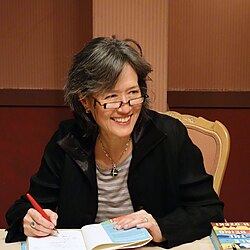Ruth Ozeki Quote
At first I was like, No way am I saying that, but when you hang out with people who are always being supergrateful and appreciating things and saying thank you, in the end it kind of rubs off, and one day after I'd flushed, I turned to the toilet and said, Thanks, toilet, and it felt pretty natural. I mean, it's the kind of thing that's okay to do if you're in a temple on the side of a mountain, but you'd better not try it in your junior high school washroom, because if your classmates catch you bowing and thanking the toilet they'll try to drown you in it. I explained this to Jiko, and she agreed it wasn't such a good idea, but that it was okay just to feel grateful sometimes, even if you don't say anything. Feeling is the important part. You don't have to make a big deal about it.
At first I was like, No way am I saying that, but when you hang out with people who are always being supergrateful and appreciating things and saying thank you, in the end it kind of rubs off, and one day after I'd flushed, I turned to the toilet and said, Thanks, toilet, and it felt pretty natural. I mean, it's the kind of thing that's okay to do if you're in a temple on the side of a mountain, but you'd better not try it in your junior high school washroom, because if your classmates catch you bowing and thanking the toilet they'll try to drown you in it. I explained this to Jiko, and she agreed it wasn't such a good idea, but that it was okay just to feel grateful sometimes, even if you don't say anything. Feeling is the important part. You don't have to make a big deal about it.
Related Quotes
About Ruth Ozeki
